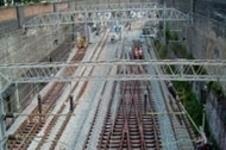"Transport innovation fund" could create 5,800 construction jobs
Three billion pounds of spending on transport projects is hanging in the balance as residents of Manchester decide whether or not they want a permanent traffic congestion charge in their city.
The vote on whether to make a pilot project permanent is due to close tomorrow with a "yes" vote releasing a £3bn "transport innovation fund" (TIF) to be spent on a number of projects such as expanding the Metrolink tram and building four new bus stations.
The £3bn would come from the government with £1.5bn to be repaid through revenue raised from the £5 charge that is payable during the morning and evening rush hours.
A recent study by Arup estimated that 5,800 construction jobs would be created across Greater Manchester by 2019 so long as seven of the 10 areas of the city being polled back the scheme.
Richard Critchley, the policy manager for transport and planning at the Greater Manchester Chamber of Commerce, said the £3bn TIF funding was “vital” and would “certainly lead to a lot more jobs”.
He added: “Train lines, bus facilities and new train stations all require heavy construction. We would still look for funding if the TIF money was taken away [if the vote is no]. Their investment is vital, but I hope we could pull together with local businesses and find other solutions.”
Geoff Hoon, the Transport Secretary, told The Times: “There will be no central government funding if the scheme is not passed. There will be none whatsoever. There is no Plan B. I would not want people to be under any illusion about that.”
The government hopes Manchester will make the scheme permanent, and lead other towns and cities across the country to follow their example.
Cambridge, Bristol and Leeds are expected to introduce similar schemes if Manchester goes ahead with the pay-as-you-drive scheme.
The pilot Manchester scheme uses a different method of collecting payment to that already in operation in central London where a ring of cameras checks number plates against who has paid the charge.
Manchester uses global positioning systems to run what is known as a "tag and beacon" process where drivers have a smartcard that is charged every time they enter the congestion zone in rush our.




























No comments yet